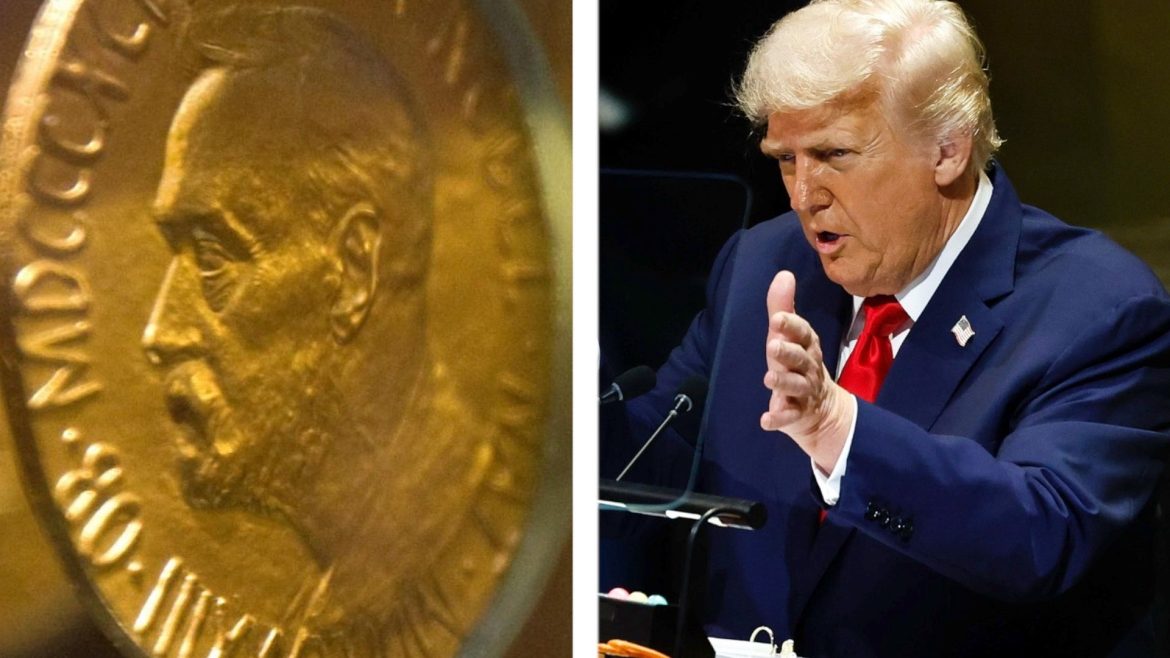Intense Speculation Ahead of Nobel Peace Prize Announcement
As the world awaits the 2025 Nobel Peace Prize announcement, much of the attention is focused on one familiar figure — former U.S. President Donald Trump.
Out of 338 individuals and organizations nominated for the prestigious award, Trump’s name has sparked the most debate. His supporters argue that he played a key role in preventing conflicts and fostering diplomatic engagement across multiple regions.
What adds intrigue is the fact that several nations, including Pakistan, have officially endorsed Trump’s candidacy, citing his “efforts toward global stability.”
Pakistan’s Support for Trump’s Nomination
Pakistan became the first country to nominate Donald Trump for the Nobel Peace Prize this year. Even senior Pakistani leaders, including Bilawal Bhutto Zardari, have publicly voiced support for the former U.S. president’s nomination — as reported in this detailed statement praising his global peace efforts.
On June 20, Pakistan’s Foreign Minister Ishaq Dar sent a formal letter to the Nobel Committee endorsing Trump’s nomination. The letter praised the former U.S. president’s “significant contributions to international peace” and recommended him as a deserving recipient.
Further reinforcing Islamabad’s stance, Prime Minister Shehbaz Sharif and Field Marshal Asim Munir, Pakistan’s army chief, reportedly met Trump in Washington during the UN General Assembly session. According to official statements, both leaders referred to him as a “messenger of peace.”
This level of endorsement from a nuclear-armed South Asian nation has drawn global media attention, particularly amid renewed diplomatic tensions in the region.
Trump’s Claimed Role in Averting India-Pakistan Conflict
One of Trump’s most talked-about assertions is that he personally helped prevent a war between Pakistan and India earlier this year.
In interviews, he claimed to have intervened in May 2025 to halt escalating hostilities that, according to him, “could have led to a nuclear exchange.”
However, India’s government under Prime Minister Narendra Modi has strongly denied these claims, dismissing them as “political exaggeration.” Pakistani officials, meanwhile, insist Trump’s involvement was real and accuse New Delhi of “refusing to acknowledge diplomatic reality.”
Islamabad has even suggested that if Trump does not win the Nobel Peace Prize, the blame would “rest with India’s intransigence.”
Global Support: From Israel to Cambodia
Trump’s nomination has also received endorsements from several other nations.
-
Israel: Prime Minister Benjamin Netanyahu submitted a letter to the Nobel Committee praising Trump for his “continued commitment to Middle East peace.”
-
Cambodia: Prime Minister Hun Manet credited Trump with mediating the Cambodia-Thailand ceasefire, which ended months of border tension.
-
Armenia and Azerbaijan: Leaders of both countries reportedly thanked Trump for his efforts in reducing their long-running border hostilities.
These endorsements, while controversial, underscore Trump’s attempt to frame himself as a global peacemaker — a narrative central to his renewed political identity.
Trump’s Claim: “I Ended Seven Wars”
In recent speeches, Trump has repeatedly said, “I ended seven wars.”
According to him, his diplomatic interventions brought peace to the following regions:
-
Pakistan and India
-
Israel and Iran
-
Egypt and Ethiopia
-
Armenia and Azerbaijan
-
Cambodia and Thailand
-
Kosovo and Serbia
-
Congo and Rwanda
Most recently, Trump has also credited himself with facilitating a ceasefire in Gaza between Israel and Hamas — a claim that remains unverified.
French President Emmanuel Macron earlier remarked that Trump should only be considered for the Nobel Prize “if he genuinely stops the Gaza war,” pointing out that U.S. weapons sales to Israel continue.
Still, Trump’s team insists that his 20-point peace plan for the Middle East, reportedly backed by several Arab and Muslim nations, helped pave the way for a temporary truce.
A Procedural Obstacle
Despite widespread nominations, one major hurdle could prevent Trump from receiving the award this year: the January 31 nomination deadline.
According to the Nobel Committee’s rules, all nominations must be submitted before this cutoff date — just days after Trump’s second presidential inauguration. As a result, many of the endorsements may have arrived too late for the 2025 cycle.
Analysts note, however, that the large number of nominations could strengthen Trump’s case for the 2026 Nobel Peace Prize, even if he is overlooked this year.
If Trump Wins
If Donald Trump does receive the Nobel Peace Prize, he will join a short list of American presidents to have earned the honor. The four previous recipients were:
-
Theodore Roosevelt (1906)
-
Woodrow Wilson (1919)
-
Jimmy Carter (2002)
-
Barack Obama (2009)
Trump’s potential inclusion would mark a politically charged moment in Nobel history — one likely to provoke both celebration and controversy across the world.















